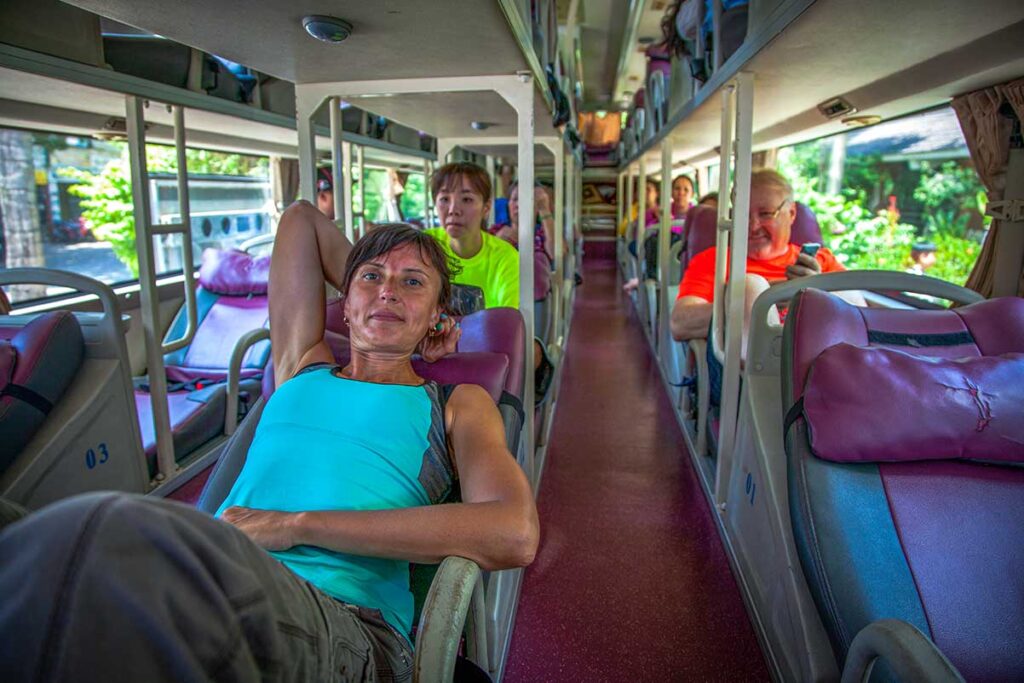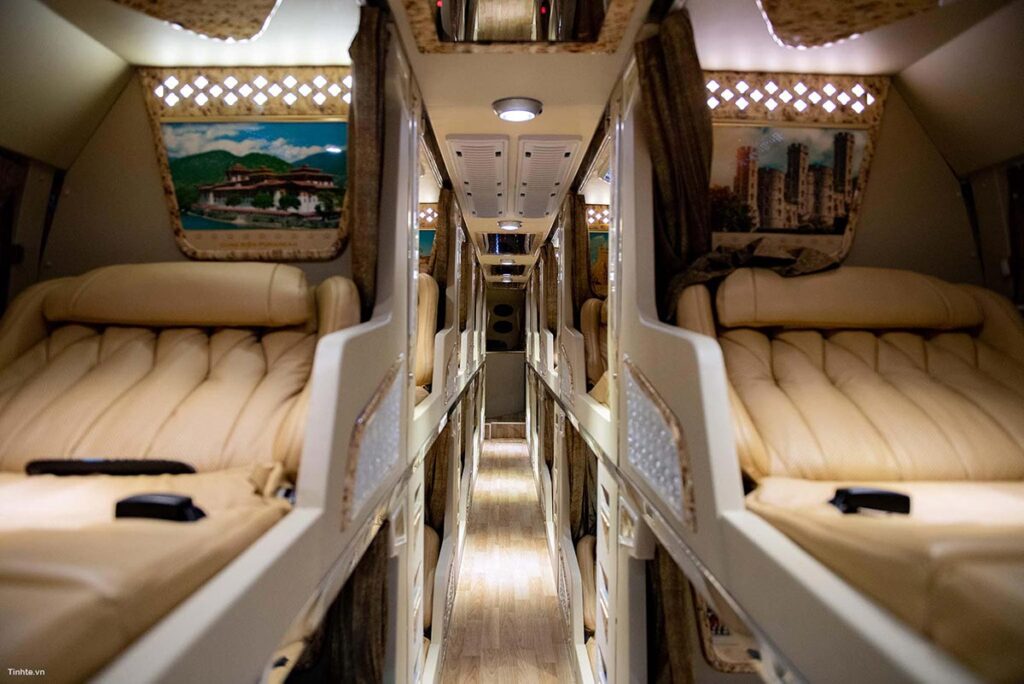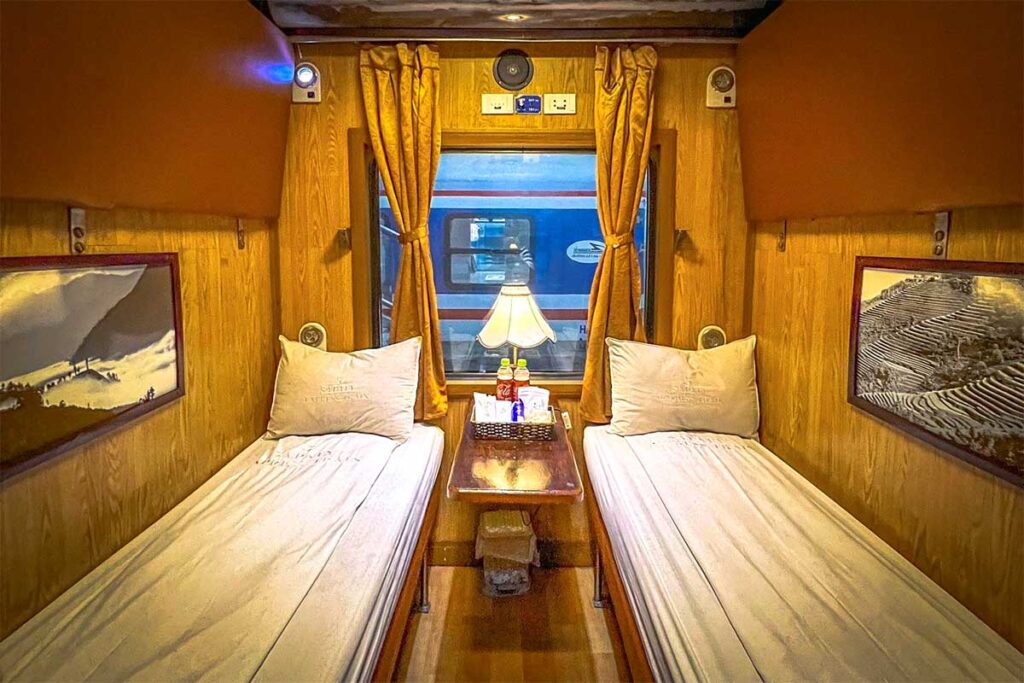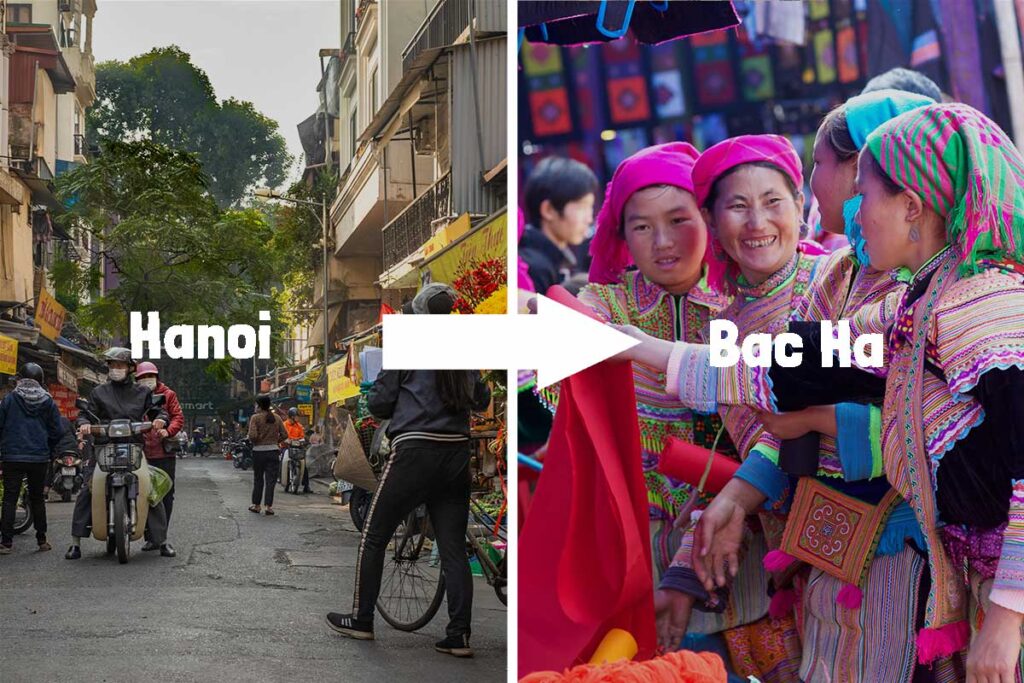Overview of the route from Hanoi to Bac Ha
Why Bac Ha is worth visiting
Most travelers heading north from Hanoi choose Sapa — and that’s exactly why Bac Ha feels so different. It’s quieter, less touristy, and best known for the Bac Ha Sunday Market, one of the most colorful ethnic markets in Vietnam. While many people visit Bac Ha as a day trip from Sapa, you can also skip Sapa entirely and travel straight here from Hanoi.

Bac Ha isn’t just about the market. You’ll find peaceful villages, local ethnic communities like the Flower Hmong, and some great trekking options. Trekking here isn’t as extensive as in Sapa, but it’s more off-the-beaten-track, with fewer crowds and more authentic encounters.
If you’re planning to explore beyond the market, staying overnight is highly recommended. Bac Ha makes a great base for visiting nearby villages, waterfalls, and even continuing further towards Ha Giang or Sapa.
For more on what to do, where to stay, and local tips, check our complete travel Guide to Bac Ha.
The route from Hanoi to Bac Ha
The distance from Hanoi to Bac Ha is about 300 kilometers by road. The good news is that the majority of the route follows a modern express highway, which means smooth driving with barely any curves or mountain passes — until the final hour near Bac Ha.
That last stretch winds through the hills, but the road is well-paved and safe. It’s also the most scenic part, offering a glimpse of the mountains and valleys that surround Bac Ha.
The fastest travel time is around 5 to 5.5 hours, depending on traffic in Hanoi and how many stops you make. Motorbikes can’t use the expressway, so if you’re riding yourself, expect the journey to take 8 to 9 hours or more.
If you go by bus or private car, it’s a direct journey from Hanoi straight to Bac Ha town. The train isn’t direct — you’ll need to travel to either Pho Lu Station (closer) or Lao Cai Station, and then continue by taxi or private car.
Option 1: Sleeper bus from Hanoi to Bac Ha
How the sleeper bus works
The sleeper bus is the most affordable and straightforward way to travel from Hanoi to Bac Ha. Buses run directly between the two towns every day, with both daytime and overnight departures available.
There are no sitting buses or limousine vans on this route — only sleeper buses designed for longer journeys. You’ll have a flat or semi-flat bed, depending on the bus type.
You have three types of sleeper buses:
- Standard sleeper bus – simple beds with no extras.
- Limousine sleeper bus – a small upgrade with curtains, USB chargers, and sometimes entertainment screens.
- VIP sleeper bus – fewer beds and almost double the space, offering more privacy and comfort.


The fastest buses make the trip in about 5.5 hours, while others take 6 to 7.5 hours, depending on the departure point in Hanoi, the route (some avoid toll expressways), rest stops, and traffic.
This is a direct trip to Bac Ha town center, so you don’t need to transfer in Lao Cai or anywhere else.
The bus is a good balance of convenience and price, but be aware it’s not always the most comfortable. Sleeper buses in Vietnam can sometimes be noisy, and space is limited — especially if you’re tall. The VIP option is much better for anyone looking for extra comfort.
Quick facts – Sleeper bus
- Duration: 5.5 to 7.5 hours
- Departure: Hanoi (exact station varies by company)
- Arrival: Bac Ha town center
- Comfort level: Basic to decent (VIP buses are noticeably more comfortable)
- Cost: 300,000–420,000 VND ($12–17 USD)
- Booking: Online (Baolau, 12Go) or through travel agencies
- Best for: Budget travelers, solo travelers, or anyone who wants a direct and affordable option
Option 2: Train + taxi from Hanoi to Bac Ha
How the train route works
There’s no direct train to Bac Ha, but you can take the train from Hanoi to either Pho Lu Station (the closest) or Lao Cai Station (the main station for Sapa).
- Pho Lu Station is only about 40 km from Bac Ha, which sounds ideal — but the downside is that very few trains stop here, and they don’t run daily. It’s not always easy to plan around.
- Lao Cai Station is much more reliable, with multiple trains every day, including comfortable overnight options with proper beds. These are the same tourist trains that most travelers use when going to Sapa.
Once you arrive at either station, you’ll need to take a taxi or a private car to reach Bac Ha. From Pho Lu, the drive is about 1 hour through scenic mountain roads. From Lao Cai, it’s a longer drive of around 1 hour and 45 minutes.
Taking the train can be a more relaxing experience, especially if you book a soft-sleeper cabin and prefer to travel overnight. It’s also a good choice if you want to combine Bac Ha with a visit to Sapa, since Lao Cai is the gateway to both.

The downsides are that the journey is longer than the direct bus or car, and the transfer from the train station to Bac Ha requires some extra planning. Also, finding a train to Pho Lu can be tricky unless your schedule is very flexible.
Quick facts – Train + Taxi
- Duration: 8–9 hours total (train + taxi)
- Departure: Hanoi Railway Station
- Arrival: Pho Lu (40 km from Bac Ha) or Lao Cai (70 km from Bac Ha)
- Comfort level: High (especially on overnight tourist trains)
- Cost: Train $20–35 USD, taxi $15–30 USD (depending on the station)
- Booking: Train via Baolau, 12Go, or directly at the station; taxi via hotel, local drivers, or pre-arranged
- Best for: Travelers who prefer overnight trains, value comfort, or plan to visit both Bac Ha and Sapa
Option 3: Private car with driver from Hanoi to Bac Ha
How the private car option works
A private car with driver is the fastest and most comfortable way to travel from Hanoi to Bac Ha. It’s a door-to-door service, meaning the driver picks you up anywhere in Hanoi — your hotel, the airport, or even a different location — and drops you directly at your accommodation in Bac Ha.
The drive takes around 5 to 5.5 hours, depending on traffic and how often you stop along the way. You have full flexibility to add short stops for food, coffee, or sightseeing, which isn’t possible with the bus.
This option is perfect for families, couples, or small groups who value comfort, privacy, and flexibility. It’s also a great choice if you want to turn the journey into part of a bigger trip — for example, combining Bac Ha with stops in Sapa, Ha Giang, or other places in northern Vietnam.
One thing to keep in mind: drivers in Vietnam are not guides. They’re experts at navigating the roads but generally won’t offer information about the region or help you interact with local communities. If you want cultural insights, help communicating with ethnic minorities, or to add a trekking experience, consider booking a local guide along with the car.
Need a private car with driver?
We offer reliable car rental with driver for trips anywhere in northern Vietnam. Whether you’re heading to Bac Ha, Sapa, Ha Giang, or planning a custom road trip, we’ve got you covered. Travel comfortably at your own pace with a local, experienced driver.
Quick Facts – Private car
- Duration: 5 to 5.5 hours (plus extra time if you make stops)
- Departure: Anywhere in Hanoi (hotel, airport, etc.)
- Arrival: Anywhere in Bac Ha (hotel, homestay, town center)
- Comfort level: Very high – private, spacious, and flexible
- Cost: $140–180 USD per car (fits up to 3–4 people)
- Booking: Through local travel agencies (like Local Vietnam) or via hotels
- Best for: Families, small groups, travelers who want maximum comfort and flexibility, or those combining Bac Ha with other northern destinations
Option 4: Motorbike (Self-drive) from Hanoi to Bac Ha
How the Motorbike Route Works
Riding a motorbike from Hanoi to Bac Ha is a real adventure, but it’s definitely not the easiest option. The distance is about 320 kilometers, and since motorbikes can’t use the expressways, you’ll have to take smaller highways and local roads.
The first part of the ride out of Hanoi is relatively flat and straightforward. But as you get closer to Bac Ha, the scenery becomes much more beautiful — with hills, valleys, and mountain views — and the roads become more winding and challenging.
This trip is not suitable for beginner riders. It’s a long, tiring day in the saddle — expect 8 to 10 hours or more, depending on your pace, breaks, and route choices. For most riders, it’s a good idea to split the journey over two days, stopping overnight somewhere along the way.
The pros? Total freedom, the ability to stop anywhere, and gorgeous scenery near Bac Ha. The cons? It’s a physically demanding ride, requires confidence in Vietnamese traffic, and you’ll need good navigation skills to avoid getting lost.
Quick Facts – Motorbike
- Duration: 8–10+ hours (better split over 2 days)
- Departure: Anywhere in Hanoi
- Arrival: Bac Ha town center
- Comfort level: Depends entirely on your riding experience
- Cost: ~$10/day (bike rental) + fuel
- Booking: Hanoi motorbike rental shops (check for quality and paperwork)
- Best for: Experienced riders looking for adventure and freedom, not recommended for beginners
Tips for traveling from Hanoi to Bac Ha
Booking train tickets
For the Hanoi to Bac Ha route, trains don’t go directly to Bac Ha. Instead, you can take a train to either Pho Lu Station (closer but with limited service) or Lao Cai Station (more frequent trains). From there, you’ll need to take a taxi or pre-arranged car to reach Bac Ha.
Booking Options:
- Vietnam Railways Official Website – dsvn.vn
This is the official train booking website in Vietnam. It has an English version, but the interface can be a bit confusing for first-time users. Only standard Vietnam Railways trains are listed here, meaning you won’t find the more comfortable tourist trains like Chapa, Violette, or Livitrans. - Baolau – baolau.com
Offers a comprehensive selection of Vietnam Railways and private tourist trains like Livitrans, Violette, and Chapa Express. You can select specific berths and receive instant e-tickets. - 12Go Asia – 12go.asia
Provides a user-friendly interface to compare train schedules and prices. It’s particularly useful for booking tourist trains.
Booking in advance is recommended, especially during weekends and holidays, as soft sleeper cabins can sell out quickly.
Booking bus tickets
Sleeper buses run daily between Hanoi and Bac Ha, offering various options from standard to VIP sleepers.
Booking Options:
- Vexere – vexere.com
Vietnam’s largest bus ticketing platform, listing operators like Futa Ha Son, Ha Tuan, and Vu Han Group. You can compare schedules, prices, and amenities, and receive e-tickets via email. - 12Go Asia – 12go.asia
Also offers bus ticket bookings, though the selection may be more limited compared to Vexere. 12go.asia
It’s advisable to book bus tickets in advance for weekend travel, as they can sell out due to the Sunday market rush in Bac Ha.
Plan around the sunday market
The Bac Ha Sunday Market is a major attraction, drawing locals and tourists alike. To experience it fully, plan to arrive in Bac Ha on Saturday or early Sunday morning. Accommodation can fill up quickly during this time, so book your stay in advance.
Train vs. Bus comfort
If you value sleep quality, overnight tourist trains offer more comfort with proper beds and quieter cabins compared to sleeper buses. However, trains require a transfer by taxi or car to reach Bac Ha, adding to the total travel time.
Combine with other destinations
Bac Ha pairs well with destinations like Sapa and Ha Giang. You can plan a multi-day loop through Northern Vietnam, exploring various ethnic markets and scenic landscapes. Private car hire offers the most flexibility for such itineraries.
Prepare for altitude
Bac Ha is situated at approximately 1,000 meters above sea level. It’s generally cooler than Hanoi, especially in the winter months. Pack accordingly, with layers to accommodate temperature changes.



